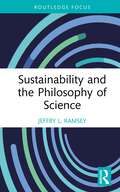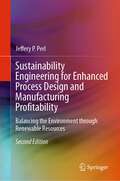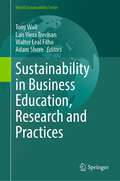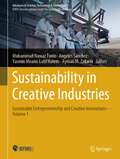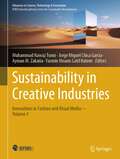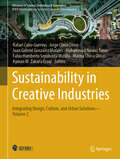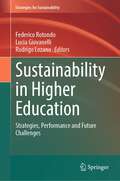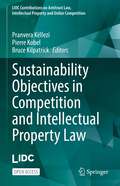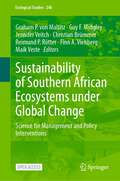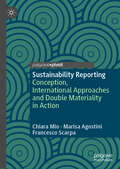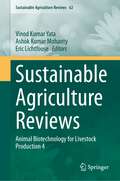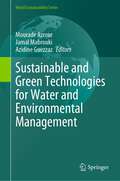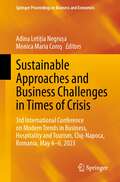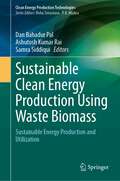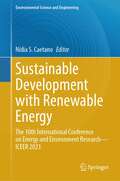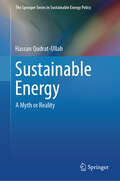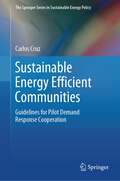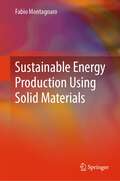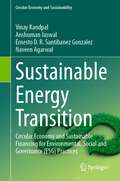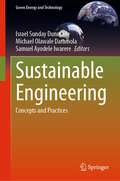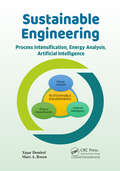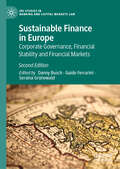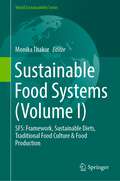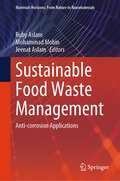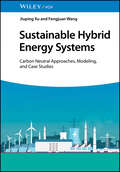- Table View
- List View
Sustainability and the Philosophy of Science (Routledge Focus on Environment and Sustainability)
by Jeffry L. RamseyThis book demonstrates how the philosophy of science can enhance our understanding of sustainability and the practices we use to enact it. Examining assumptions about concepts, theories, evidence, and the moral ideals of sustainability can better orient us as we pursue this urgent and important goal. The book applies perspectives and tools from the philosophy of science – construed broadly to include portions of science and technology studies, history of science, and philosophy more generally – to sustainability discourse. It argues that widely held assumptions regarding the meaning of concepts, methods of theorizing and inferential practice, evidential structure, and ethics limit our understanding and practice of sustainability. It offers philosophical alternatives that capture more fully the confusing, wicked nature of sustainability challenges. The alternatives draw attention to existing but often undervalued frameworks in sustainability discourse. This book is aimed towards academics, researchers, and post-graduates working in sustainability, as well as philosophers of science and environmental philosophers interested in the philosophical issues raised by the pursuit of sustainability.
Sustainability Engineering for Enhanced Process Design and Manufacturing Profitability: Balancing the Environment through Renewable Resources
by Jeffery P. PerlNow in an expanded and revised second edition, this book explores sustainability engineering through the lens of the manufacturing and chemical process industries to explain the safe and economical implementation of process designs to transform raw materials into valuable finished products. The author applies the principles of sustainability science to engineering methodology for residential, commercial, and industrial applications that support the perpetual availability of raw materials through recycling, reuse, and repurposing to incorporate inexhaustible supplies and encompasses the management and conservation of these resources in a manner that minimizes negative environmental impacts. New sections include:Coverage of electric power opportunities and challenges (solar, wind, and cogeneration),Efficiency improvement as an energy supply extender, Recycling as a material extender. The book examines relevant energy policies driving and affecting commercial, industrial, and residential energy utilization and includes new industrial case studies. Anyone involved in the design or manufacture of chemicals or the upgrade of existing manufacturing processes will benefit from this book’s suggestions for identifying improvement options while adding the pivotal aspect of sustainability to the usual cost and safety equation optimization elements.
Sustainability in Business Education, Research and Practices (World Sustainability Series)
by Tony Wall Laís Viera Trevisan Walter Leal Filho Adam ShoreThe connections between sustainability and business education are becoming increasingly important due to the growing recognition of environmental and social challenges, as well as the role that businesses play in addressing these challenges. Businesses have a significant impact on the environment, society, and the economy. Issues such as climate change, resource depletion, social inequality, and ethical concerns directly affect business operations and performance. Business education needs to equip future leaders with the knowledge and skills to navigate these challenges responsibly. This book provides a platform for the dissemination of information on the latest initiatives and practices in these areas, and promotes future cooperation between universities and business schools across the globe.
Sustainability in Creative Industries: Sustainable Entrepreneurship and Creative Innovations—Volume 1 (Advances in Science, Technology & Innovation)
by Muhammad Nawaz Tunio Angeles Sánchez Yasmin Moanis Latif Hatem Ayman M. ZakariaThis book discusses a compelling array of topics at the intersection of entrepreneurship, education, and technological innovation within the creative industries. It delves into a captivating exploration of sustainable entrepreneurship in Part 1, where key characteristics of sustainable entrepreneurs and factors influencing entrepreneurial intention are dissected. By unearthing the nexus between entrepreneurial alertness, networking capability, and venture performance, it provides intriguing insights into sustaining traditional crafts and brands amid the COVID-19 pandemic. The following parts not only unveil current innovative pedagogical strategies in creative design education but propels you into the future, exploring the harmonious fusion of academia and industry in sustainability-driven programs. Designed for educators, students, researchers, and practitioners in entrepreneurship, design, and technology fields, this book offers a transformative journey into sustainable practices, innovative pedagogies, and cutting-edge advancements. Engaging, informative, and thought-provoking, it is a must-read for those seeking to shape the future of creative industries through entrepreneurship, education, and innovation.
Sustainability in Creative Industries: Innovations in Fashion and Visual Media—Volume 3 (Advances in Science, Technology & Innovation)
by Muhammad Nawaz Tunio Jorge Miguel Chica Garcia Ayman M. Zakaria Yasmin Moanis Latif HatemIn this volume, sustainable creative industries become a beacon for innovative change, forging a path towards a conscious, harmonious world. This volume offers a panoramic view of the future, where innovations in fashion and visual media blend seamlessly with a commitment to a more sustainable and impactful world. More specifically, this volume explores the compelling interplay of sustainability, creativity, and advocacy, casting a spotlight on the transformative potential within fashion and visual media. It embarks on a journey through the innovative landscapes of fashion, where sustainability takes center stage, through an exploration of genderless mode development, contemporary patterns, and reimagined design strategies that breathe new life into tradition. As readers explore the chapters within, the symbiotic relationship between visual media and sustainability emerges, further delve into the evolution of visual communication design and the potency of Instagram microblogs in shaping perceptions and awareness. Furthermore, the role of design in disseminating critical information during disasters is unveiled and the ways in which narrative methods can ignite meaningful change explored.
Sustainability in Creative Industries: Integrating Design, Culture, and Urban Solutions—Volume 2 (Advances in Science, Technology & Innovation)
by Muhammad Nawaz Tunio Jorge Chica-Olmo Rafael Cano-Guervos Juan Gabriel González Morales Fabio Humberto Sepúlveda Murillo Marina Checa Olivas Ayman M. Zakaria EraqiThis book discusses the dynamic interplay of creativity and sustainability in the realm of design, offering a captivating exploration of innovative practices and their environmental impact. From biomimetic inspirations to biophilic designs, it unveils a spectrum of ideas in sustainable architecture. It further dives into inclusive and creative designs, social sustainability for the elderly amid the pandemic. This book casts a spotlight on the intricate synergy between preserving cultural heritage and fostering creative industries. It explores the profound significance of architectural lighting, the innovative reinterpretation of traditional motifs, and the enduring allure of heritage design within its chapters, creating an engaging and thought-provoking journey. Moreover, it ventures into the Integration of Creative Design in Urban Planning, presenting a futuristic outlook that seamlessly blends technology, sustainability, and human-centric solutions. Designed for a wide audience, including professionals, educators, and students, this book is a compelling resource for those passionate about the intersection of creativity and sustainability. It offers thought-provoking ideas, informative case studies, and a glimpse into the future of design that transcends boundaries.
Sustainability in Higher Education: Strategies, Performance and Future Challenges (Strategies for Sustainability)
by Rodrigo Lozano Federico Rotondo Lucia GiovanelliThis contributed volume addresses the issue of how higher education institutions can systematically reorient themselves to help society become more sustainable. In particular, a strategic management approach is used to overcome the fragmentation of sustainability initiatives increasingly conducted by higher education institutions worldwide. In this book, eminent scholars in the field of sustainability in higher education combine their different backgrounds to propose conceptual frameworks for interpreting and measuring sustainability integration in higher education institutions. The chapters contained herein explore which processes and management tools should be used, as well the challenges to be faced, to make sustainable innovation effective. The cases present in this volume offer a guide for higher education institution management to lead the sustainability transition.
Sustainability Objectives in Competition and Intellectual Property Law (LIDC Contributions on Antitrust Law, Intellectual Property and Unfair Competition)
by Pranvera Këllezi Pierre Kobel Bruce KilpatrickThis open access volume of LIDC contributions focuses on how competition and intellectual property laws incorporate sustainability objectives. Businesses are increasingly embracing sustainability objectives, driven by the international community. Although competition and intellectual property law are certainly not the only tools for addressing sustainability issues, they can play a role in moving toward a more sustainable society.Sustainability has gained prominence in competition law in all jurisdictions covered in this volume. The contributions focus on classic questions such as whether sustainability agreements restrict competition and, if so, to what extent businesses can be exempted on efficiency grounds. The papers also raise a number of questions, in particular concerning the treatment of non-market efficiencies. The soft law and case law produced by competition authorities are examined, and the leadership role of some competition authorities in the field – from advocacy to policy papers and sustainability guidelines – is highlighted. The authors call for more individual guidance to provide enhanced transparency and clarity to industry, advisors and society at large on sustainability issues, with guidelines or sustainability-related block exemptions providing even greater legal certainty.With regard to intellectual property, the contributions examine various important issues, such as the need for intellectual property rights to remain technology-neutral, ways to promote the use of sustainable technologies and incentives for licensing, and ways to promote the dissemination of sustainable technologies, including compulsory licensing, cross-licensing, open source or FRAND licensing, and replacing the destruction of counterfeit goods with recycling. The papers also discuss greenwashing and how it can be addressed through revisions to trademarks and related rights.
Sustainability of Southern African Ecosystems under Global Change: Science for Management and Policy Interventions (Ecological Studies #248)
by Graham P. von Maltitz Guy F. Midgley Jennifer Veitch Christian Brümmer Reimund P. Rötter Finn A. Viehberg Maik VesteThis open access book about the sustainability of marine and terrestrial ecosystems in southern Africa provides a synthesis of the research program Science Partnerships for the Adaptation to Complex Earth System Processes (SPACES II, 2018-2022). It addresses the scientific, social, and economic issues related to climate change, its potential impacts on the various ecosystems, adaptations, and management interventions for enhancing systems resilience in Southern Africa. It is written by numerous scientists from African states and Germany and summarizes the latest research findings, which are of great relevance for a better understanding of climate change impacts, adaptations, and vulnerabilities as well as for developing management options and policy options to reduce the associated risks. This is crucial considering that the projected African population increase is exceptional. Furthermore, climate change is assumed to hit southern Africa extremely hard with a significant increase in extreme events and the frequency of severe droughts, heat waves, and flooding. Southern Africa hosts a high variety of ecosystems, which belongs to important biodiversity hotspots for unique flora and fauna. The surrounding oceans form, in turn, a bottle neck within the ocean’s global thermohaline circulation, act as a still poorly understood carbon sink and source and play an important role for fisheries as they are highly productive. Considering these important aspects, the book is an important interdisciplinary contribution to the scientific literature and will find a wide readership.The book is aimed at students, teachers, and scientists in the fields of terrestrial and marine ecology, environmental, nature and landscape planning, agriculture, environmental and resource management, biodiversity, and nature conservation, as well as scientists and representatives in specialised authorities and associations, nature conservationists, and policy makers of related disciplines.
Sustainability Reporting: Conception, International Approaches and Double Materiality in Action (Palgrave Studies in Impact Finance)
by Chiara Mio Marisa Agostini Francesco ScarpaThe book provides a comprehensive exploration of the the evolution in sustainability reporting and non-financial disclosure from three perspectives: regulatory, literary, and empirical. First, the book discusses the variety of frameworks and standards, normative sources, and regulatory initiatives aimed at promoting and standardizing sustainability reporting at the international level. Second, the book offers a systematic review of academic literature on sustainability reporting and non-financial disclosure. Third, the book examines the concept of materiality in sustainability reporting and provides an empirical analysis of the quantity and quality of materiality disclosures in sustainability reporting across the globe. The book concludes by discussing future directions for developments in sustainability reporting research and practice, and is relevant to academics, practitioners, and students interested in the intersection of sustainability, corporate reporting, and corporate finance.
Sustainable Agriculture Reviews: Animal Biotechnology for Livestock Production 4 (Sustainable Agriculture Reviews #62)
by Vinod Kumar Yata Ashok Kumar Mohanty Eric LichtfouseThis book presents advanced reviews on latest developments and future trends of animal biotechnology with focus on computational and experimental approaches. The articles in this book discusses the implications of recent methods in animal biotechnology to improve the livestock production. Applications of omics technologies and system biology approaches for livestock production and animal disorders were discussed in detail. The evolution of transgenic technology, genome editing and markers for early pregnancy detection were elucidated in this book. A couple of chapters were dedicated to understanding the role of gut microbiome, probiotics and prebiotics on livestock health and production. The nanomaterials have been shown been shown beneficial effects in biological applications. This book also discussed the veterinary applications of nanomaterials. The articles of this book provide state of the art information that is appropriate to academicians, researchers and students who are involved in the animal biotechnology research.
Sustainable and Green Technologies for Water and Environmental Management (World Sustainability Series)
by Mourade Azrour Jamal Mabrouki Azidine GuezzazThis book introduces a variety of the latest researches that are related to smart devices, machine learning algorithms, and the Internet of things that are applied for a sustainable environment. These recent technologies cover all fields including agriculture, transportation, smart grid, smart building, and others. In addition, IoT has provided an innovative vision that is completely alternative to the conventional methodologies: the new approach comes in the form of a single-component system that can be connected to the network and can incorporate smart policies. As a consequence, the covered subjects encompass smart system design and control, networking and machine learning, environmental monitoring and surveillance, smart meters, authentication and authorization, ensuring private data security, software solutions, and systems, among others. This book covers subjects that are related to the Internet of Things and smart used tools and methods for fighting environmental problems. Therefore, it discusses recent ideas that are not covered by other competitor books. This book is different because it can be a reference for researchers, professionals, and students in both smart thinking and environmental domains.
Sustainable Approaches and Business Challenges in Times of Crisis: 3rd International Conference on Modern Trends in Business, Hospitality and Tourism, Cluj-Napoca, Romania, May 4-6, 2023 (Springer Proceedings in Business and Economics)
by Adina Letiția Negrușa Monica Maria CoroşThis book discusses current trends, challenges, and opportunities in the fields of business, hospitality, and tourism, particularly in Eastern Europe. Featuring selected papers presented at the second annual Modern Trends in Business Hospitality and Tourism International Conference held in Cluj-Napoca, Romania in 2023, the enclosed chapters explore the global marketing environment discussing the latest technological, economic and social-cultural developments. Featuring theoretical and empirical research and real-life case studies, this book explores topics such as global capital markets and investment financing post COVID-19, sustainable business models, financing alternatives for SMEs, corporate governance, human capital leadership, among others. It is appropriate for academics, researchers, scholars and practitioners in the areas of business, hospitality and tourism.
Sustainable Clean Energy Production Using Waste Biomass: Sustainable Energy Production and Utilization (Clean Energy Production Technologies)
by Dan Bahadur Pal Ashutosh Kumar Rai Samra SiddiquiThis edited volume covers sustainable biomass valorization and its application in various sectors.Bioenergy has concerned enormous attention as a promising alternative to conventional energy resources. Abundance of bioresources and their renewable nature provides a distinct advantage to biofuels from sustainability perspective. Biofuels have found increasing applications in the energy and transportation sector in recent years. Blended fuels are being used worldwide. However, several challenges remain to be addressed due to the diverse nature of biomasses and inherent recalcitrant nature of biological materials used as feedstock. This book aims to provide an overview of recent developments in the production of bioenergy and its applications in various areas. Specific emphasis is given to production of biofuels from modern biomass such as agro-forest waste and dedicated non-edible energy crops that do not interfere with food production. The scope of the book covers synthesis and characterization of biologically derived fuels, advances in microbiological methods and enzyme engineering approaches. The book covers techno-economic analysis to identify challenges and prospects for commercialization of biofuels. The directions for future research should pave way for net zero scenario for a sustainable world.The book will cater to a wide range of readers interested in learning the fundamentals as well as advances in the field of biofuels.
Sustainable Development with Renewable Energy: The 10th International Conference on Energy and Environment Research—ICEER 2023 (Environmental Science and Engineering)
by Nídia S. CaetanoThis proceedings book contains the full papers of the 10th edition of the International Conference on Energy and Environment Research, ICEER 2023, that took place in Madrid, Spain during October 7–9, 2023. ICEER 2023 is a joint organization of the School of Engineering (ISEP) of the Polytechnic of Porto (P.Porto) and the SCIEI, with collaboration of the Dipartimento di Ingegneria of the Università degli studi "Roma Tre", CIETI and LEPABE research groups. This book includes all the well prepared full papers presented at ICEER 2023.
Sustainable Energy: A Myth or Reality (The Springer Series in Sustainable Energy Policy)
by Hassan Qudrat-UllahThis book embarks on a transformative journey through the complex landscape of renewable energy, challenging prevailing myths and uncovering the realities that define our energy future. At the heart of this exploration lies the dynamic intersection of technology and sustainability, spotlighting the critical nexus where innovation meets eco-conscious solutions. Far from a mere debunking exercise, this book unfolds as a comprehensive narrative, weaving through the complex tapestry of challenges and opportunities that define the sustainable energy paradigm. Unravelling misconceptions surrounding sustainable energy, the book places a particular emphasis on renewable sources like solar and wind, providing a profound understanding that extends beyond the surface. Engaging case studies and examples punctuate the narrative, offering a firsthand glimpse into the practical applications and challenges of sustainable energy projects. Designed for a diverse readership, the book speaks to: (i) Students and teachers: Delving into the scientific and technical intricacies of sustainable energy sources, along with their broader environmental, social, and economic impacts. (ii) Researchers and professionals: Offering an up-to-the-minute guide to the latest developments and trends in the ever-evolving field of sustainable energy. (iii) Policy makers and activists: Providing a nuanced exploration of the facts and evidence underpinning sustainable energy, alongside an insightful examination of the myths and misconceptions that surround it. (iv) General readers: Inviting all who seek to broaden their knowledge and awareness of sustainable energy, understanding its profound relevance and importance for the collective future of humanity and the planet. This book isn't just a journey; it's a call to action. As you turn the pages, you're not only gaining knowledge but becoming part of a movement toward a resilient and eco-friendly tomorrow. Embrace the future of energy – informed, inspired, and empowered.
Sustainable Energy Efficient Communities: Guidelines for Pilot Demand Response Cooperation (The Springer Series in Sustainable Energy Policy)
by Carlos CruzThis book analyses issues surrounding the efficient integration of demand response programmes in residential communities. It also explores the benefits and energy efficiency co-ordination corresponding to demand response service in a cooperative system. The author explains how sensors, communication technologies, computational ability, and control can be effectively combined to create a demand planification system. Smart appliances (SAs) and other connected devices, together with smart communities (SCs)—which enable energy consumers to pursue common goals through cooperation and coordinated behaviour within the framework of the Internet of things (IoT)—have raised expectations regarding deployment of the information and communication technologies (ICTs) to encourage uptake of demand response (DR) energy efficiency programmes. DR programmes pursue a reduced carbon footprint, balanced supply and demand, and behavioural change in consumers. The book provides sustainable evidence of ICT-supported energy management that can help consumers flexibly manage demand through the formation of sustainable SCs that maximise renewable energy use through large-scale cooperative management mechanisms. SCs cooperating securely in identifying consumption patterns can foster sustainable and efficient energy use, with the outcome of benefits for the participants and for the environment.
Sustainable Energy Production Using Solid Materials
by Fabio MontagnaroThis textbook focuses on sustainable energy production using solid materials. With explanatory tables and figures, case studies, worked-out examples, and up-to-date bibliographies of other works, the book provides an in-depth exploration of the most innovative aspects of the field.Readers of the book will gain critical skills in characterizing and reacting to biomass, including the formation of pollutants, as well as using fluidized bed reactors for heterogeneous processes. The book also explores innovative methods for mitigating the greenhouse effect, reusing ashes as adsorbents or in cement production, and thermochemical solar energy storage. This book will give students, novice researchers, and industry professionals valuable insights and knowledge into the sustainable production of energy using solid materials.
Sustainable Energy Transition: Circular Economy and Sustainable Financing for Environmental, Social and Governance (ESG) Practices (Circular Economy and Sustainability)
by Vinay Kandpal Anshuman Jaswal Ernesto D.R. Santibanez Gonzalez Naveen AgarwalThe book offers a comprehensive overview of the challenges and opportunities associated with the transition to sustainable energy, circular economy, and sustainable financing for ESG practices. The publication is needed at this time because the world is facing urgent environmental and social challenges, such as climate change, resource depletion, and social inequality, which require a fundamental transformation of our economic and social systems. The transition to sustainable energy, circular economy, and sustainable financing for ESG practices offers a promising pathway to address these challenges and achieve sustainable development goals.The purpose of the publication is to provide a holistic and practical guide for policymakers, business leaders, investors, and other stakeholders who are interested in advancing sustainable energy, circular economy, and ESG practices. The book covers a range of topics, including the drivers of the transition, policy frameworks and regulations, technology and innovation, business models and financial instruments, and the role of stakeholders in facilitating the transition. It also emphasizes the importance of integrated approaches that balance economic, social, and environmental objectives, and provides practical examples and case studies of successful sustainable energy, circular economy, and ESG practices from around the world.The new contribution of this publication is its interdisciplinary and practical approach to sustainable energy, circular economy, and ESG practices. The book draws on the latest research from various fields, including economics, engineering, environmental science, and social science, and provides a synthesis of best practices and lessons learned from a diverse range of stakeholders, such as governments, businesses, and civil society organizations. The publication also provides a roadmap for how stakeholders can work together overcome the challenges of the transition and create a more sustainable and equitable future.The book is a timely and essential guide for anyone who is interested in advancing sustainable development goals. The book provides a comprehensive overview of the challenges and opportunities associated with the transition to sustainable energy, circular economy, and sustainable financing for ESG practices and offers practical solutions and case studies from around the world. Its interdisciplinary and practical approach makes it a valuable resource for policymakers, business leaders, investors, and other stakeholders who are committed to creating a more sustainable and equitable future.
Sustainable Engineering: Concepts and Practices (Green Energy and Technology)
by Israel Sunday Dunmade Michael Olawale Daramola Samuel Ayodele IwarereSustainable Engineering: Concepts and Practices provides insights into current perspectives on sustainable engineering research. It highlights the drivers, motivations, and challenges affecting the development and adoption of sustainable engineering in various sectors of the economy and how they impact sustainable development. Contributions from researchers representing multiple branches of engineering in academia, government laboratories, and industry present alternative approaches to traditional engineering practices. These approaches effect change, making the design, construction, production, and management of products, processes, and systems more environmentally friendly, socially beneficial, and economically profitable. The book will be a trusted reference for graduate students, practicing engineers, and other professionals interested in developing or using sustainable products and systems.
Sustainable Engineering: Process Intensification, Energy Analysis, and Artificial Intelligence
by Yasar Demirel Marc A. RosenSustainable engineering is of great importance for resilient and agile technology and society. This book balances economics, environment, and societal elements of sustainable engineering by integrating process intensification, energy analysis, and artificial intelligence to reduce production costs, improve the use of material and energy, product quality, safety, societal well-being, and water usage. The book provides comprehensive discussion of topics on process intensification, energy analysis, and artificial intelligence that include optimization, energy integration, green engineering, pinch analysis, exergy analysis, feasibility analysis, life cycle assessment, circular economy, bioeconomy, data processing, machine learning, expert systems, digital twins, and self-optimized plants for sustainable engineering.
Sustainable Finance in Europe: Corporate Governance, Financial Stability and Financial Markets (EBI Studies in Banking and Capital Markets Law)
by Guido Ferrarini Danny Busch Seraina GrünewaldThis second edition brings together the views of expert academics and practitioners on the latest regulatory developments in sustainable finance in Europe and includes 5 new chapters on sustainable remuneration, reporting, lending, green monetary policy and ESG. The volume includes a wide range of cutting-edge issues, which relate to three main themes along which the volume is structured: (1) corporate governance; (2) monetary policy and financial stability ; and (3) financial markets. With individual contributions deploying different methods of analysis, including theoretical contributions on the status quo of macro-financial research as well as law and economics approaches, the collection encourages interdisciplinary readership and will appeal to those researching capital markets law, European financial law, and sustainable finance, as well as practitioners within the finance industry.
Sustainable Food Systems: SFS: Framework, Sustainable Diets, Traditional Food Culture & Food Production (World Sustainability Series)
by Monika ThakurSustainable Food System is a food system that delivers food safety & security as two key elements and nutrition for masses having impact on their social, economic, and environmental bases to generate nutritional food security for future generations shall not be compromised. Therefore, SFS targets the economic sustainability, social sustainability and environmental sustainability and makes a robust system having expansive benefits for the society. This concept of Sustainable Food System under SDG Goals is such a vast concept that, it has been impossible to highlight all the concepts in one volume. Therefore, the Editor have compiled this voluminous, comprehensive and compendious approach as balanced and organized structure of work as: Sustainable Food System Volume I & II.The Sustainable Food System (Volume - I): framework, sustainable diets, Traditional Food Culture & Food production has a very comprehensive outline and divided in 4 major sections and further 24 different chapters. The book addresses both the theoretical and applied aspects of sustainable food diverse food systems A Sustainable Food System (SFS) is a comprehensive food system that targets the sustainable diets, traditional food culture with indigenous system and the overall food production on as well. All chapters in different sections will be written by key scientists with diverse backgrounds in either industry / R&D / academia, and will provide an update on emerging ideas and sustainable technologies as well as vision for the future. The 1st section: Sustainable Food System: concepts & framework primarily focusing on the Sustainable food systems, its conceptual introduction, framework and different concepts nationally & internationally. The 2nd section: Responsible consumption and sustainable diets deals with different aspects of nutrients sustaining health & sustainable diets. The 3rd section: Conservation and promotion of Traditional Food Culture, covers the conservation & promotion of traditional food cultures & their practices. The last & 4th section: Climate change and sustainable food production provide the current knowledge and innovative developments related to climate change, nutritional security & agronomic bio-fortification.
Sustainable Food Waste Management: Anti-corrosion Applications (Materials Horizons: From Nature to Nanomaterials)
by Ruby Aslam Mohammad Mobin Jeenat AslamThis book highlights established research and technology on corrosion inhibitors and bio-waste management. It further discusses emerging aspects of utilizing food waste in the field of corrosion inhibition. The topics covered include overview on bio-waste and their management, different types of food waste (i.e., agricultural, vegetable and fruit/fruit juice, plant waste, slaughterhouse trash), and their application as corrosion inhibitors and mitigation of corrosion. It also discusses economic aspects and commercialization of food waste as corrosion inhibitors. The book is a valuable reference for beginners, researchers, and professionals working in the areas of sustainability, food waste management, and material science.
Sustainable Hybrid Energy Systems: Carbon Neutral Approaches, Modeling, and Case Studies
by Jiuping Xu Fengjuan WangSustainable Hybrid Energy Systems Discovering comprehensive approaches to build sustainable hybrid energy systems Hybridization is the eternal theme of human energy utilization. However, it has never been more important than it is now because of the urgency of promoting energy transition and achieving carbon neutrality. Therefore, exploring the design, combustion, operation, and policy challenges of sustainable hybrid energy systems becomes increasingly important. Sustainable Hybrid Energy Systems: Carbon Neutral Approaches, Modeling, and Case Studies provides a detailed explanation of these aspects. Dividing hybrid energy systems into three categories—co-located, co-combusted, and co-operated, this book emphasizes the deployment optimization, emission quota allocation, scheduling coordination, and renewable portfolio standards implementation of these systems. The results are essential tools for understanding the current and future of multi-input single-output hybrid energy systems. Sustainable Hybrid Energy Systems readers will also find: Clear logical framework that reveals the constitutes of hybrid energy systems.Systematic technical scheme for building an economic, environmental, flexible, and resilient future energy system.Extensive case studies from single power plant level, multiple power plant level, and grid level.Effective guidelines for wider application of the proposed carbon neutral approaches. Sustainable Hybrid Energy Systems is ideal for power engineers, electrical engineers, scientists in industry, and environmental researchers looking to understand these energy solutions. It will also provide collectible value for libraries.
